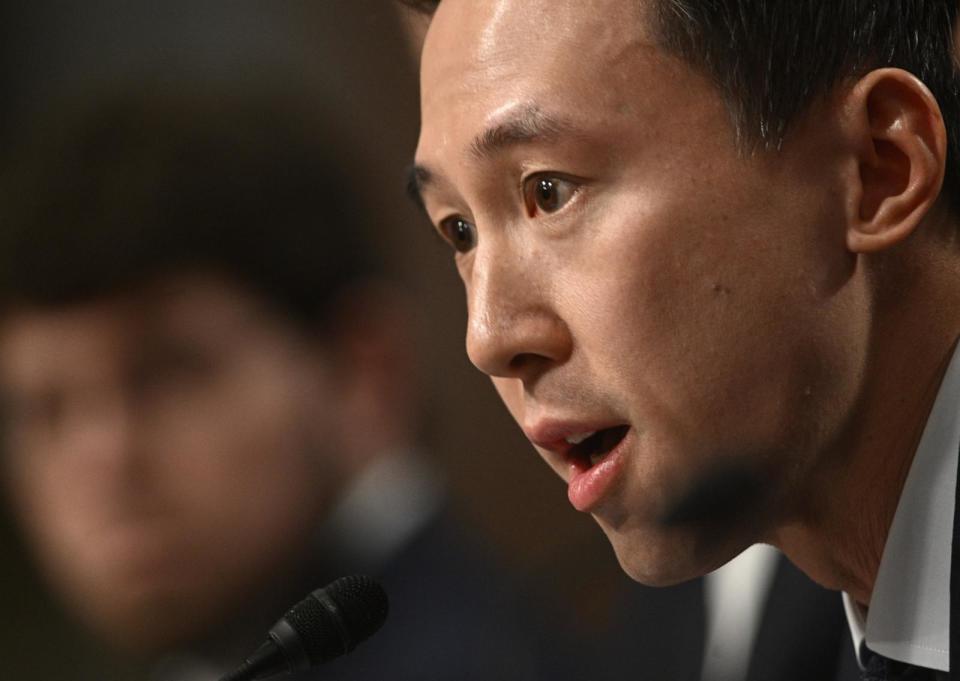A potential ban on TikTok in the United States sailed through the House of Representatives over the weekend as part of a bipartisan $95 billion foreign aid package.
The social media crackdown may be poised to become law, as President Joe Biden has promised to sign it if it passes the Senate and reaches his desk.
The TikTok measure could still be removed from the foreign aid legislation in the Senate, but that would require the entire package to be sent back to the House for another vote – at the same time lawmakers on both sides have of the aisle. stressed the urgency to act on the additional money for Ukraine and Israel.
If enacted, the measure would force its Chinese parent company, ByteDance, to sell the popular social media app. In the absence of a sale, the app would be banned.
The TikTok ban is wrapped in Speaker Johnson’s foreign aid package: What happens next?
TikTok did not immediately respond to ABC News’ request for comment. In a previous statement, TikTok criticized the renewed efforts behind the divestment.
“It is unfortunate that the House of Representatives is using the important foreign and humanitarian aid coverage to jam again through a prohibition bill that would violate the free speech rights of 170 million Americans, destroy 7 million businesses, and shutter a platform that helps. $24 billion to the US economy, annually,” the platform said.
Here’s what you need to know about whether the ban will ever go into effect, what it means for users and how people can look to bypass it:
Will TikTok finally get banned?
Even if the move becomes law, TikTok can still avoid a ban.
ByteDance could choose to sell TikTok, ensuring the app’s continued availability to US users. The bill passed in the House gives ByteDance nine months to sell, with a possible three-month extension.
Regardless of a possible sale, the move is likely to trigger a legal challenge on First Amendment grounds that could invalidate the law entirely, experts say.
TikTok and its users could challenge the law as a violation of constitutionally protected freedom of speech, Anupam Chander, a professor of law and technology at Georgetown University, previously told ABC News. Against that, the US government is likely to argue that national security concerns should outweigh First Amendment protections, Chander said.
Congress Moves to Force TikTok to Sell or Face US Ban: What’s Next
Last May, TikTok sued Montana in federal court over a state-enacted ban on the app, saying the law violated users’ First Amendment rights. Months later, in November, a federal judge ruled in favor of TikTok and blocked the law before it took effect.
However, the action in Montana could provide a small insight into the legal outcome of a federal ban, Sarah Kreps, director of Cornell University’s Technology Policy Institute, told ABC News. In Montana, lawmakers banned TikTok for privacy and child safety reasons, while the federal statute draws on national security concerns.
“This is apples and oranges,” Kreps said.
However, if the United States enacts a law banning TikTok, a federal judge may order a temporary pause while the legal challenge goes through the court system because of the far-reaching consequences of such a move.

How would a potential ban work?
The measure would have banned TikTok by removing it from US app stores, including popular iPhone and Android platforms.
New customers would not be able to download the app, and existing users would lose access to critical updates, experts told ABC News.
“Users can still keep the app on their mobile devices, but they won’t be able to get the updates and eventually it will be out of date,” Qi Liao, a professor of computer science at Central Michigan University, told ABC News.
Users might be able to use the app for up to one year after the ban goes into effect, Liao added, but the app would degrade and eventually become inoperable.
The potential decline of the app, Kreps said, would be a “slow fizzle.”
“The reasons people want to use TikTok is because it’s easy, it’s fun, it has a nice user interface,” Kreps said. “Without updates over time, it wouldn’t have the same qualities that users liked.”
Will users find ways around the ban?
Some users would probably be able to get around the ban, but it would be too difficult or difficult for many, experts said.
“For the majority of people, it will be a lot of trouble,” said Liao. “For someone who is tech-savvy and motivated, they can do it.”
For example, individuals could install an offline app that bypasses the app store, Liao said. To do this, he said, one could download an installation package from the Internet, transfer it to a USB drive and transfer it to his phone.
Individuals could also use a Virtual Private Network, or VPN, which allows a person to pose as a user to log in from an overseas location, thereby circumventing the US-specific ban, experts said.
Some users would get around the ban but over time, the hassle and hassle would likely drive them to a competing service, Kreps said.
“It’s not going to be an on/off switch,” she said. “But people prefer the path of least resistance.”
ABC News’ Lauren Peller, Alex Ederson and Jay O’Brien contributed to this report.
It seems that Congress is ready to ban TikTok in the US. How would it work? appeared first on abcnews.go.com